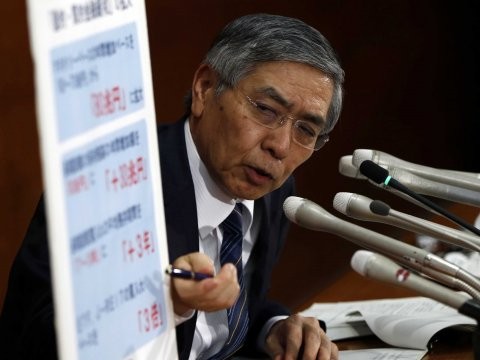How Japan s New Stimulus Will Affect the US News
Post on: 25 Май, 2015 No Comment

Japan’s central bankers are following the Fed’s lead.
A man checks his mobile phone as he walks by an electronic stock board of a securities firm in Tokyo showing Japan’s benchmark Nikkei 225 stock index that gained 272.34 points to 12,634.54 on April 4, 2013. Earlier in the day the Bank of Japan announced a policy overhaul intended to double the money supply and achieve a 2 percent inflation target at the earliest possible time, with a time horizon of about two years.
The Federal Reserve’s easy-money policies are becoming infectious. First Europe followed suit, to some extent. Now Japan is attempting its own shock-and-awe monetary policy.
[READ: Cyprus Better for Foreign Investors Than U.S. ]
The Bank of Japan recently announced an intensified quantitative easing strategy meant to end a 15-year deflationary spiral, boost the Japanese stock market and reinvigorate the stagnant Japanese economy. While Japan faces different economic problems than the United States, the BOJ’s program, like the Fed’s, will involve ramped up purchases of long-term bonds.
That’s QE big time, John Makin of the American Enterprise Institute explained in a blog post. The BOJ knows it has to shock markets to help boost asset prices and the economy.
The BOJ is trying to end a long deflationary cycle that has depressed spending and the whole Japanese economy. Deflation is pernicious because it creates an incentive to put off purchases as long as possible, since most prices are likely to be lower in the future. Japanese consumers have become so used to deflation that the BOJ may struggle to convince them it’s finally over.
More bond purchases by the BOJ ought to have the same effect as the Fed’s bond purchases: Interest rates in Japan will fall, which will make stocks and other risky assets more attractive to investors seeking higher returns on their money. So stock prices ought to rise. The value of the yen will fall relative to the dollar and other currencies, as some investor money leaves Japan seeking higher returns elsewhere. That will make Japanese imports to other countries a bit cheaper.
The impact on the U.S. economy will probably be modest, but still important for investors to take note.
[READ: How a Second Korean War Would Hurt the U.S. ]
It’s not going to hit everything in the United States, says Jeffrey Rosen, chief economist at Briefing.com, a research and data site. But it will hit sectors that compete with Japanese products. The biggest are autos and electronics, which means prices for such products could soften.
As interest rates fall in Japan, that will generate a bit of downward pressure on U.S. interest rates as well. Other factors—especially the Fed’s own policies—affect rates more, but still, with central banks throughout the developed world generally pursuing the same policies, it will help keep rates low everywhere, perhaps for longer than investors have been predicting.
The same dynamic will probably affect the stock market. Investment advisers have been highlighting beaten-down Japanese stocks as a buy since late last year, when Japan’s incoming prime minister, Shinzo Abe, vowed aggressive new action to revive the Japanese economy. Since the U.S. market is already in the fifth year of a bull rally, a rising tide in Japan will have a limited upward effect on U.S. stocks. But a Japanese rally will generate upward momentum instead of a downward pull. And shrewd investors who target the right assets in Japan could enjoy handsome gains.
Japan’s latest moves aren’t universally popular. Forcing the value of the yen down will give Japanese exporters such as Toyota and Sony a fresh edge in other markets, including the United States and perhaps even China. U.S. auto executives perpetually gripe about an undervalued yen. Yet the Fed has essentially done the same thing by pushing U.S. rates down during the last four years.
[READ: European Job Woes Make U.S. Look Brilliant ]
Other nations can’t really complain about the weaker yen, says Makin. They have done the same kind of QE themselves.
On the whole, a stronger Japanese economy is good for everybody, since it would boost trade and generate more global economic activity. Now Japan just needs to make it happen.
Rick Newman’s latest book is Rebounders: How Winners Pivot From Setback to Success. Follow him on Twitter: @rickjnewman.














